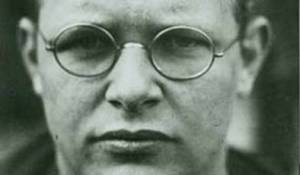“Monday Musings” for
Monday April 8,2013
Volume III, No. 13/116
Monday Musings
By: Assad Meymandi, MD, PhD,
DLFAPA*
Dietrich Bonhoeffer – His Legacy of Noble writing, justice and moderation
Exactly 68 years ago, On April 9, 1945, on the gray morning of Easter week, Dietrich Bonhoeffer was hanged. He was 30. Germany was on the verge of total defeat. But Hitler’s killing machine was still operating. Bonhoeffer was charged as a traitor to Hitler and to the Nazi regime. We are dedicating today’s “Monday Musings” to honor the memory of this outstanding scholar, theologian, Lutheran pastor and writer. Bonhoeffer was the son of a well to do and prominent German neurologist, professor of neurology and psychiatry at the University of Berlin and the director of the psychiatric clinic at Charité Hospital in Berlin, Dr. Karl Bonhoeffer. Dietrich, with his twin sister, were the fifth and sixth of eight children. His mother, Paula von Hase, was a daughter of Klara von Hase, a Countess by marriage who had been a pupil of Clara Schumann and Franz Liszt Paula was a college graduate and home-schooled the children. The family was full of classical musicians and music advocates. He was in America in 1930, and later pastored miners and common people in Barcelona as a pastor and not academic theologian. He was interested in ecumenism. He concentrated on removing and neutralizing Hitler and his despotic regime.
Dietrich was an exceptional pianist, and his parents thought he might pursue a music career. He was also athletic and played championship tennis and chess. He was expected to follow his father into neurology and psychiatry, but he surprised and dismayed his parents when he decided by age of fourteen to become a theologian and later a pastor. When his older brother told him not to waste his life in such a “poor, feeble, boring, petty, bourgeois institution as the Church”, 14-year-old Dietrich replied: “If what you say is true, I shall reform it!” What we learn from his later life, he was a martyr, too. Just like Socrates who had a chance to escape the prison where he was awaiting death sentence on charges of corrupting the youth of Athens, Dietrich, too, had a chance to accept the help of the World Council of Churches and flee to US. But he did not. He waited his trial, spending two years in jail before his execution. During his time in jail, he wrote a series of articles and treatises about human rights and humanities that approach Socratic dialogues in their eloquence and Plato’s Republic in the beauty of poetry and linguistic supremacy. From prison, he also wrote love letters to his twin sister. The collection of these letters and the ones written to other members of his family and friends provide superb reading to understand the potential strength of conscience and man’s devotion to the truth. And the truth to him was that the Nazi Regime was despotic in need of elimination. He was a participant in the German resistance movement against Nazism and a founding member of the Confessing Church. His involvement in plans by members of the Abwehr (the German Military Intelligence Office) to assassinate Adolf Hitler resulted in his arrest in April 1943 and his subsequent execution by hanging in April 1945, 23 days before the Nazis’ surrender. However, recent research now challenges the assumption that he was directly involved in the assassination attempt. His view of Christianity’s role in the secular world is well-known. He did not advocate theocracy, but strongly suggested that humanity ought to be governed by laws that are fair, righteous and moral. As a matter of fact, the last thing he did before approaching the gallows, he was reading from his pocket edition of Plutarch, and was quoting from Bible. Faithful readers of this space recall that we reviewed Plutarch book “Moralia”. Dietrich Bonhoeffer was reading passages from that book before his execution.
Bonhoeffer has written 25 books all worth reading and re-reading. From the collection, I find myself going back to two volumes, Act and Being.
Like any classic literature, Bonhoeffer’s writings have a theme, are written with elevated and noble language, and change the lives of the readers. His pen continues to speak to us today.
*The writer is Adjunct Professor of Psychiatry, University of North Carolina School of Medicine at Chapel Hill, Distinguished Life fellow American Psychiatric Association, and Founding Editor and Editor-in-Chief, Wake County Physician Magazine (1995-2012). He serves as a Visiting Scholar and lecturer on Medicine, the Arts and Humanities at his alma mater the George Washington University School of Medicine and Health.



